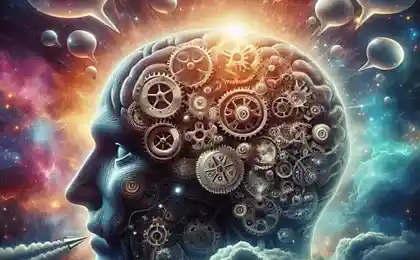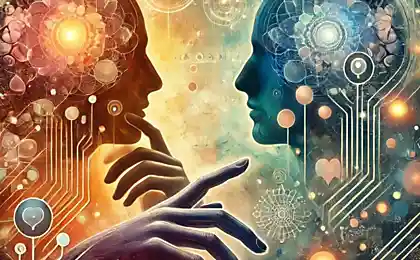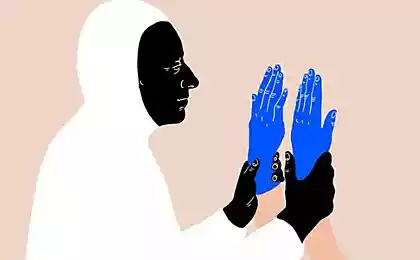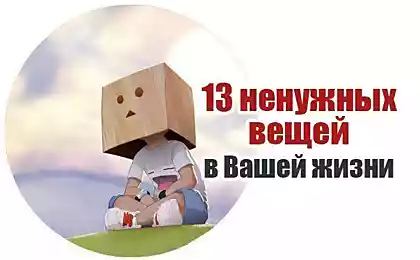508
Empathy to self: stop condemning yourself for mistakes!
About empathy for myself "... the Most important application of the language of nonviolent communication is the ability to make contact with yourself. When we are cruel to ourselves, we find it difficult to show true empathy to others.

Usually at the training, I ask participants to recall a recent occasion when they did something she regretted. Then we watch as they talked with him once after he committed an act that is usually characterized as "error" or "mistake". And I usually hear:
But even if it is sometimes possible to "learn" from the mistakes that we ourselves, I am concerned about the nature of the force that is behind this lesson. I would prefer that the changes were caused by a clear desire to enrich their lives or those of others —and not as destructive forces, as the feeling of shame or guilt.
Translation judgment the Basic premise of nonviolent communication:whenever we say that someone is wrong or bad, in fact we announce that he or she is not acting in harmony with our needs.
If we judge ourselves, then we say: "I do not work in harmony with their own needs." I am convinced that if we learn to assess, in terms of how well are our needs, the assessment will bring us a much bigger favor.
In this case, if our actions do not serve the enrichment of life, our task is to evaluate the actions step by step so that:
1. cause changes in the direction that we are more satisfied;
2. to proceed from respect and empathy to yourself, not out of hatred, guilt or shame.
Regret After a lifetime spent in the school and society, for most of us, probably too difficult to retrain yourself to think in terms of their own needs and values at any given moment.
However, just as we learned to recognize judgment in conversations with others, we can learn to recognize self-judgment and immediately focus on those needs that stand behind it.
For example, when unfavorable reaction to some of his actions — "Look, you've ruined it again!" — you can quickly stop and ask ourselves: "What unmet need is being expressed through this moralistic judgment?".
Once we understand the need — or even multiple layers of needs, we will notice wonderful changes. Instead of depression, feelings of shame or guilt that we probably experienced, criticizing ourselves for having "messed up again", we will be able to experience any other feeling. Whether it's sadness, disappointment, fear, regret, or anything else — doesn't matter. The very nature of these feelings brings us to mobilize for the execution of what we need. Their impact on our spirit and body is significantly different from that of the disorder, which causes depression, feelings of shame or guilt.
Regret in non-violent communication is the process of connecting with unmet needs and feelings that arose when we were not up to par. It is the experience of remorse, but the kind that helps us to learn from their actions without accusation or self-hatred.

Forgiveness is the process of regret is followed by forgiveness of self. Paying attention to that part of us that has taken actions that caused this situation, we ask: "When I did it, what need I was trying to satisfy?". I'm sure that people always act in accordance with their needs and values. It does not matter, will lead this action to the satisfaction or dissatisfaction of needs...
Listening to yourself with empathy, we can hear a basic need. Forgiveness of self occurs at the moment when there is this empathic connection. Then we can realize how our choice was an attempt to serve life, even if the process of regret teaches us that it does not meet our needs.
"Do it effortlessly!"
In addition to the process of contrition and forgiveness, I emphasize another important aspect of empathy to yourself: the power behind all our actions... I truly believe that an important aspect of empathy to yourself is the ability to make choices, guided by a pure desire to contribute to life, not with fear, guilt, shame, duty or obligation. When we feel that action is the goal, designed to enrich the lives that we are driven by only the desire to make life beautiful for someone else, even in heavy work there is the element of the game. On the contrary, even a joyful activity, reflected by obligations, fear, feelings of guilt or shame, ceases to be joyous and ultimately generates resistance." published
Author: Marshall Rosenberg, from the book "Nonviolent communication"
P. S. And remember, just changing your mind — together we change the world! ©
Source: ecotechnology

Usually at the training, I ask participants to recall a recent occasion when they did something she regretted. Then we watch as they talked with him once after he committed an act that is usually characterized as "error" or "mistake". And I usually hear:
- "That was stupid!",
- "How did you manage that?",
- "What happened to you?",
- "You always ruin everything!",
- "You're so selfish!".
But even if it is sometimes possible to "learn" from the mistakes that we ourselves, I am concerned about the nature of the force that is behind this lesson. I would prefer that the changes were caused by a clear desire to enrich their lives or those of others —and not as destructive forces, as the feeling of shame or guilt.
Translation judgment the Basic premise of nonviolent communication:whenever we say that someone is wrong or bad, in fact we announce that he or she is not acting in harmony with our needs.
If we judge ourselves, then we say: "I do not work in harmony with their own needs." I am convinced that if we learn to assess, in terms of how well are our needs, the assessment will bring us a much bigger favor.
In this case, if our actions do not serve the enrichment of life, our task is to evaluate the actions step by step so that:
1. cause changes in the direction that we are more satisfied;
2. to proceed from respect and empathy to yourself, not out of hatred, guilt or shame.
Regret After a lifetime spent in the school and society, for most of us, probably too difficult to retrain yourself to think in terms of their own needs and values at any given moment.
However, just as we learned to recognize judgment in conversations with others, we can learn to recognize self-judgment and immediately focus on those needs that stand behind it.
For example, when unfavorable reaction to some of his actions — "Look, you've ruined it again!" — you can quickly stop and ask ourselves: "What unmet need is being expressed through this moralistic judgment?".
Once we understand the need — or even multiple layers of needs, we will notice wonderful changes. Instead of depression, feelings of shame or guilt that we probably experienced, criticizing ourselves for having "messed up again", we will be able to experience any other feeling. Whether it's sadness, disappointment, fear, regret, or anything else — doesn't matter. The very nature of these feelings brings us to mobilize for the execution of what we need. Their impact on our spirit and body is significantly different from that of the disorder, which causes depression, feelings of shame or guilt.
Regret in non-violent communication is the process of connecting with unmet needs and feelings that arose when we were not up to par. It is the experience of remorse, but the kind that helps us to learn from their actions without accusation or self-hatred.

Forgiveness is the process of regret is followed by forgiveness of self. Paying attention to that part of us that has taken actions that caused this situation, we ask: "When I did it, what need I was trying to satisfy?". I'm sure that people always act in accordance with their needs and values. It does not matter, will lead this action to the satisfaction or dissatisfaction of needs...
Listening to yourself with empathy, we can hear a basic need. Forgiveness of self occurs at the moment when there is this empathic connection. Then we can realize how our choice was an attempt to serve life, even if the process of regret teaches us that it does not meet our needs.
"Do it effortlessly!"
In addition to the process of contrition and forgiveness, I emphasize another important aspect of empathy to yourself: the power behind all our actions... I truly believe that an important aspect of empathy to yourself is the ability to make choices, guided by a pure desire to contribute to life, not with fear, guilt, shame, duty or obligation. When we feel that action is the goal, designed to enrich the lives that we are driven by only the desire to make life beautiful for someone else, even in heavy work there is the element of the game. On the contrary, even a joyful activity, reflected by obligations, fear, feelings of guilt or shame, ceases to be joyous and ultimately generates resistance." published
Author: Marshall Rosenberg, from the book "Nonviolent communication"
P. S. And remember, just changing your mind — together we change the world! ©
Source: ecotechnology
Choose your method of feeding: type alpha and type omega
The 10 commandments of the perfect wife, which is almost 400 years!























